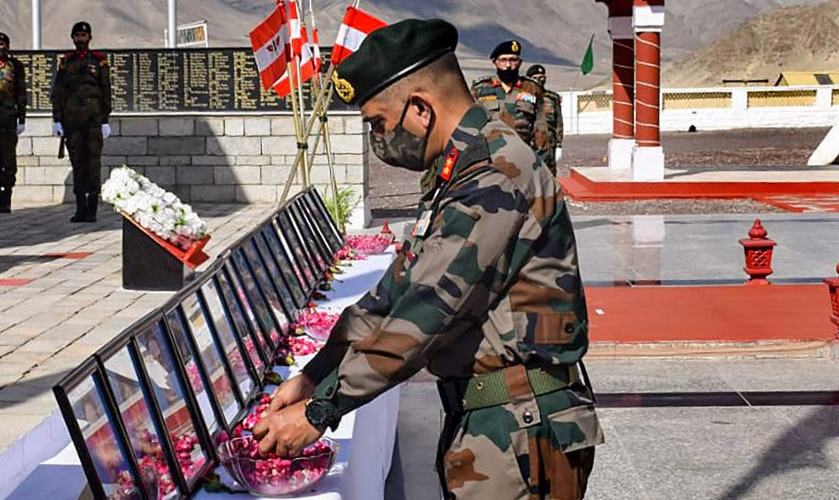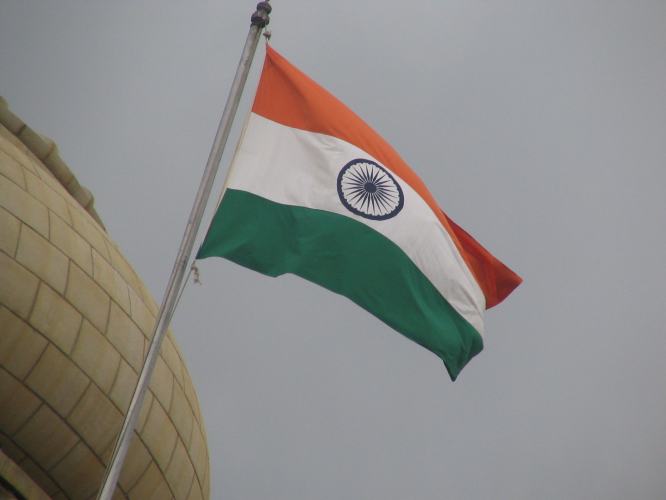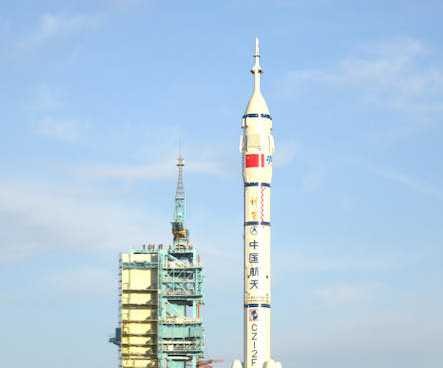
Maj Gen Akash Kaushik, Officiating GOC Fire and Fury Corps laid a wreath at Leh War Memorial and paid homage to martyrs who laid down their lives at Galwan on 15 Jun 2020 while fighting for the Nation. A PTI Photo
NEW DELHI (PTI): Chief of Army Staff Gen MM Naravane on Tuesday led the force in hailing the valour of the 20 soldiers who laid down their lives while defending the country's territorial integrity in the face of "unprecedented" Chinese aggression at the Galwan Valley in Eastern Ladakh a year ago.
On the first anniversary of the deadly clashes, the Army said the supreme sacrifice of the soldiers while fighting the adversary in the "most difficult" high altitude terrain will be "eternally etched" in the memory of the nation.
"General MM Naravane #COAS & All Ranks of #IndianArmy pay homage to the #Bravehearts who made supreme sacrifice in Galwan Valley #Ladakh while defending the territorial integrity and sovereignty of the country. Their valour will be eternally etched in the memory of the #Nation," the Army tweeted.
In the first deadly clash in the border area in nearly five decades, 20 Indian soldiers were killed on June 15 last year in the Galwan Valley in fierce hand-to-hand combat with Chinese troops, triggering a large deployment of troops and heavy weaponry by both armies at the friction points in eastern Ladakh.
In February, China officially acknowledged that five Chinese military officers and soldiers were killed in the clashes with the Indian Army though it is widely believed that the death toll was higher.
The Army's Leh-based 14 Corps, popularly known as Fire and Fury Corps, also paid homage to the "Galwan Bravehearts" on the first anniversary of the violent clashes.
"In the face of unprecedented Chinese aggression, 20 Indian soldiers laid down their lives defending our land and inflicted heavy casualties on the PLA (People's Liberation Army," the Army said.
Major Gen Akash Kaushik, the officiating General Officer Commanding of the Fire and Fury Corps laid a wreath at the iconic Leh war memorial while paying homage to the fallen heroes. The 14 Corps takes care of guarding the Line of Actual Control (LAC) with China in the Ladakh region.
"The nation will remain eternally grateful to these gallant soldiers who fought in the most difficult high altitude terrain and made the supreme sacrifice in service of the nation," the Army said in a statement.
Colonel Bikumalla Santosh Babu, the commanding officer of the 16 Bihar regiment, had led from the front against the Chinese aggression near Patrolling Point 14 in Galwan Valley.In January, he was posthumously awarded Mahavir Chakra, the second-highest military award for acts of gallantry in the presence of the enemy.
Four other soldiers, Naib Subedar Nuduram Soren, Havildar (Gunner) K Palani, Naik Deepak Singh and Sepoy Gurtej Singh, were also awarded the Vir Chakra posthumously.
"Colonel Bikumalla Santosh Babu displayed conspicuous #gallantry, exemplary #leadership and firm determination in the face of the enemy in the best traditions of the #IndianArmy," the Army tweeted.
It said Naib Subedar Soren displayed indomitable courage, undaunting leadership and bravery of high order in the face of aggression by the enemy.
In a series of tweets, the Army also hailed the bravery of Naik Deepak Singh, Sepoy Gurtej Singh and Havildar Palani.
The Army last year built a memorial for the 'Gallants of Galwan' at Post 120 in eastern Ladakh.
The memorial mentioned their heroics under operation 'Snow Leopard' and the way they evicted the PLA troops from the area while inflicting "heavy casualties" on them.
The names of the 20 Army personnel were also inscribed on the National War Memorial in Delhi.
Days after the clashes, External Affairs Minister S Jaishankar had bluntly told his Chinese counterpart that the "unprecedented development will have a serious impact on the bilateral relationship.
India held the neighbouring country accountable for triggering the Ladakh standoff by violating rules of engagement on border management and conveyed that peace and tranquillity along the LAC is the basis for the progress of the rest of the relationship and they cannot be separated.
Months later, Jaishankar and Chinese Foreign Minister Wang Yi agreed on a five-point pact to resolve the row at a meeting in Moscow.
The two sides completed the withdrawal of troops and weapons from the North and South banks of Pangong lake in February following a series of military and diplomatic talks.
They are now engaged in talks to extend the disengagement process to the remaining friction points.
There was no visible forward movement in disengagement of troops in the remaining friction points as the Chinese side did not show flexibility in their approach on it at the 11th round of military talks.
Last month, Army Chief Gen Naravane had said that there can be no de-escalation without complete disengagement at all friction points in eastern Ladakh and that the Indian Army is prepared for all contingencies in the region.
Gen Naravane also said that India is dealing with China in a "firm" and "non-escalatory" manner to ensure the sanctity of its claims in eastern Ladakh, and that it was even open to initiating confidence-building measures.
India has been insisting on complete disengagement in remaining friction points to de-escalate the situation in Eastern Ladakh.
 Previous Article
Previous Article Next Article
Next Article













The Indian Air Force, in its flight trials evaluation report submitted before the Defence Ministry l..
view articleAn insight into the Medium Multi-Role Combat Aircraft competition...
view articleSky enthusiasts can now spot the International Space Station (ISS) commanded by Indian-American astr..
view article